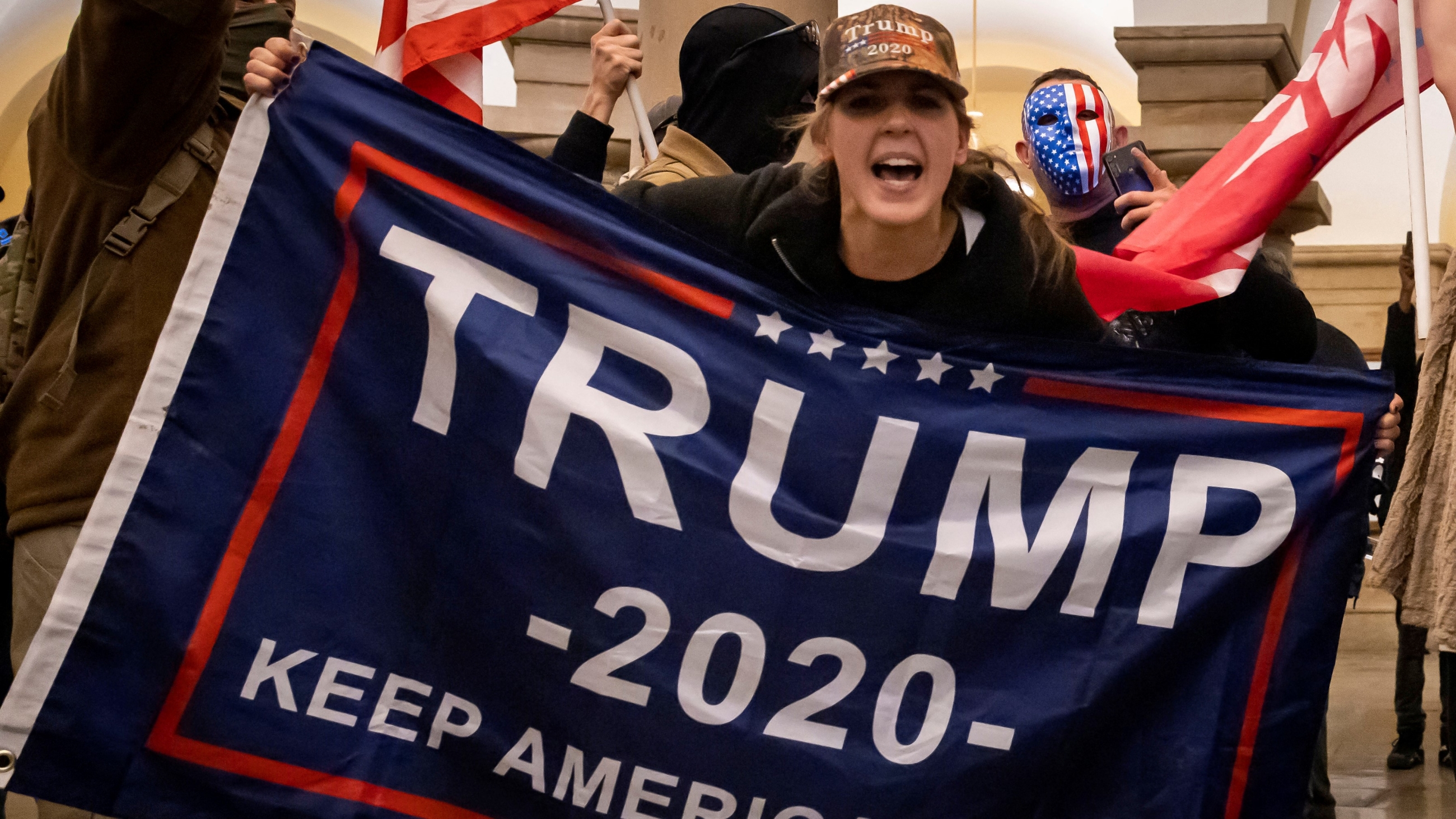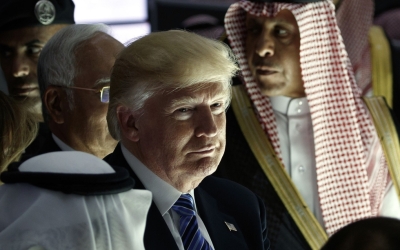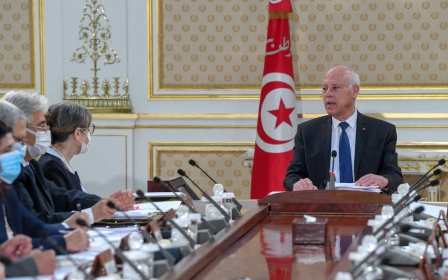America's crisis of democracy has emboldened Arab dictators

Over the last few months, there have been several coups and attempted coups in the Arab world. All of these coups - in Tunisia, Sudan and the attempted coup in Jordan - suggest a nasty turn in the dreams of the region after the Arab Spring protests of 2010 and 2011 had promised the “Holy Grail” of democracy.
The Tunisian coup was particularly disheartening, as much hope had been invested in the democratic process that had resulted in a relatively well-functioning power-sharing polity.
Inspired by the reactionary rulers of Saudi Arabia and the United Arab Emirates, old-fashioned Arab dictators are back in the saddle
The chronology of these coups, happening as they did in the aftermath of the attempted US coup orchestrated by the former President Donald Trump on 6 January, bears some analysis.
In April, news emerged from Jordan that there had been an attempted coup by Prince Hamzah bin Hussein, the eldest son of the late King Hussein and his fourth wife, the US-born Queen Noor, in which allegedly the Saudis were also involved.
In July, in Tunisia, President Kais Saied declared that he would rule by decree and suspended the newly minted constitution. In October, in Sudan, General Abdel Fattah al-Burhan staged a military coup against the civilian-military alliance, led by Prime Minister Abdalla Hamdok, that had governed since the 2019 ousting of dictator Omar al-Bashir.
New MEE newsletter: Jerusalem Dispatch
Sign up to get the latest insights and analysis on Israel-Palestine, alongside Turkey Unpacked and other MEE newsletters
Global consequences
These are all variations on the theme of General Abdel Fattah el-Sisi's military coup of July 2013 in Egypt - when the democratically elected Mohamed Morsi was deposed - with the bloody Syrian military dictatorship as Sisi's role model.
Supported by the regimes in Saudi Arabia and the United Arab Emirates, old-fashioned Arab dictators are back in the saddle, makings sure their autocratic regimes crush any aspirations for democracy their restless populations might hold. Meanwhile, on 6 January, in the “land of the free and the home of the brave”, the world watched in horror at the attempted coup, with Trump exposing the hidden underbelly of the US's imperial claim on democracy.
It is worth considering whether the attempted coup in Washington had any catalytic effect on the rest of the world in general and on these old-fashioned Arab coups in particular?
To be sure, the Syrian and Egyptian models long predated the American attempted coup, while those in Jordan, Tunisia and Sudan followed. But what can we make of this concurrence: mere coincidence or a more substantial connection, from the US to Jordan, to Tunisia, to Sudan?
The events of 6 January at the US Capitol were hardly the first time the world had witnessed an American-inspired coup. The US has long been organising coups around the world - as evidenced in Guatemala, Chile and Iran, to give just three examples. But still, the image of Americans going on the rampage in Washington DC has global consequences - Arab dictators do as America does, not as America says.
'End of US hegemony'
Most decent Americans who still have a faint hope in a functioning democracy are deeply and rightly concerned that the entire Republican Party is now cast in the image of Trump. If Trump, as has been suggested, is poised to return in the 2024 presidential election with a vengeance, it will once and for all put an end to the US charade of claiming to be a global beacon of democracy.
There is a Republican plot against the poorest and most vulnerable Americans to deny them their rights to vote, very much on the model of the racist Jim Crow laws that sustained the rule of the white supremacists in the US for a century. The state of angst now palatable in the US daily news has global consequences.
Some have suggested the term “self-coup” for what Trump tried to do between the time he was declared to have lost the election early in November 2020 and late January 2021 when he was unceremoniously kicked out of the White House.
“Trump’s measures to overturn the elections since 3 November constitute a 'coup', as they involve illegal usurpation of state power, even when it may not involve the use of force," wrote Charles T Call for Brookings, a Washington think tank. "Yet it is a 'self'-coup because it is perpetrated by the head of government rather than military officers or others against that chief executive.” This might be a case of parsing words between a “coup” and a “self-coup”, but still, the fact of the proto-fascism at the root of Trump’s presidency has shaken the democratic claims of this country to its foundations.
The proto-fascism at the root of Trump’s presidency has shaken the democratic claims of this country to its foundations
In a piece for The Economist, Francis Fukuyama wrote about “the end of American hegemony”.
“The truth of the matter is that the end of the American era had come much earlier," he wrote. "The long-term sources of American weakness and decline are more domestic than international. The country will remain a great power for many years, but just how influential it will be depends on its ability to fix its internal problems, rather than its foreign policy.”
Fukuyama is telling the world that the decline of the US imperial exercise is due to its domestic disorder - and that it is this disorder that is the source of chaos around the globe. No one is minding the shop, as it were. The corrupt cop on the beat has been caught red-handed plotting to overthrow its claim to democracy.
Democracy as an abstraction
The abstract ideal of democracy has long since lost any credibility. The US and the leading nations of Europe have an ugly colonial and imperial underbelly that belies their claims on being a legitimate model for democracy.
But the recent attempted coup in the US, and the possible return of Trump, has marked a critical point when the racially foregrounded, white-supremacist backbone of any US claim to democracy was globally exposed. The entire American experience is increasingly viewed as a model of hypocrisy, duplicity and delusional politics, with a consistent record of human misery.
The US has for most of its history posited itself as the leader of the free world. But can the US after four years of Trump, freely and enthusiastically elected by millions of Americans, sustain that delusion? Could a presidency that began like a reality TV show and ended with an attempted coup have any claim on such a lofty title?
Of course, in reality, the US has never been any such leader; its long history of genocide, slavery and xenophobia could scarcely lend itself to any such presumption.
The events of 6 January placed the US in the same ballpark as Egypt, Tunisia and Sudan, where the pretence of democracy in the former and the absence of democracy in the latter come together to map out a different topography of democratic prospects around the globe.
As I write, the entire machinery of the Republican Party is hard at work disenfranchising an entire segment of the electorate from voting in general elections. How is that different from the military thugs in Egypt or Sudan disregarding the democratic will of their people?
Democracy is the aggregate sum of all its practices around the globe and not a mystical power hanging on its ideals and aspirations. The coups and attempted coups in the Arab world are today integral to a global culture of illegitimate state power seeking to keep itself in control despite political desolation, social unrest, economic despondency, and environmental calamity.
Such states are the very source of that global menace - not a solution to it.
The views expressed in this article belong to the author and do not necessarily reflect the editorial policy of Middle East Eye.
Middle East Eye delivers independent and unrivalled coverage and analysis of the Middle East, North Africa and beyond. To learn more about republishing this content and the associated fees, please fill out this form. More about MEE can be found here.








